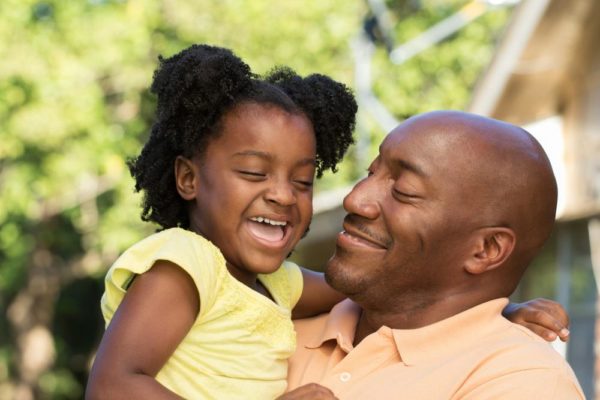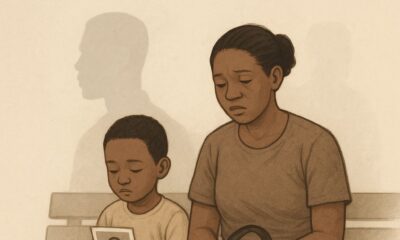Features
Oluranti Fatoye: Trauma On Children Has a Long-lasting Impact on Society
 Untold millions of people who have been in attendance when babies are born (doctors, midwives, nurses, family members) have taken it for granted that the newborn will cry out of physical necessity. Amazingly enough, they did not perceive the obvious fact that the face distorted with pain and the little creature’s cries were nothing other than the expression of psychic distress. It actually is in the way the newborns have been treated until very recently, that society makes the first of its many contributions toward equipping a person with destructive and self-destructive tendencies.
Untold millions of people who have been in attendance when babies are born (doctors, midwives, nurses, family members) have taken it for granted that the newborn will cry out of physical necessity. Amazingly enough, they did not perceive the obvious fact that the face distorted with pain and the little creature’s cries were nothing other than the expression of psychic distress. It actually is in the way the newborns have been treated until very recently, that society makes the first of its many contributions toward equipping a person with destructive and self-destructive tendencies.
The contrast between the pain-wracked and the smiling faces of newborns is all it takes for me to realize with horror what we have done to our children out of insensitivity and lack of awareness. Yet this contrast is also all it takes to awaken in me the hope that someday in the future, we will be able to do away with the unwanted seeds of violence.
If battered children such as Hitler, Eichmann, Höss, etc. were and are able to destroy human life on the monumental scale history clearly indicates they did, then it is only logical to ask how beneficial an influence children who are not battered or abused can have on the world when they grow up.
For some years now there has been proof that the devastating effects of the traumatization of children take their inevitable toll on society. This knowledge concerns every single one of us, and if disseminated widely enough should lead to fundamental changes in society, above all to a halt in the blind escalation of violence. The following points are intended to amplify my meaning:
1. All children are born to grow, to develop, to live, to love, and to articulate their needs and feelings for their self-protection.
2. For their development, children need the respect and protection of adults who take them seriously, love them, and honestly help them to become oriented in the world.
3. When these vital needs are frustrated, and children are instead abused for the sake of adults’ needs by being exploited, beaten, punished, taken advantage of, manipulated, neglected, or deceived without the intervention of any witness, then their integrity will be lastingly impaired.
4. The normal reactions to such injury should be anger and pain; since children in this hurtful kind of environment, however, are forbidden to express their anger, and since it would be unbearable to experience their pain all alone, they are compelled to suppress their feelings, repress all memory of the trauma, and idealize those guilty of the abuse. Later they will have no memory of what was done to them.
5. Disassociated from the original cause, their feelings of anger, helplessness, despair, longing, anxiety, and pain will find expression in destructive acts against others (criminal behaviour, mass murder) or against themselves (drug addiction, alcoholism, prostitution, psychic disorders, suicide).
6. If these people become parents, they will then often direct acts of revenge for their mistreatment in childhood against their own children, whom they use as scapegoats. Child abuse is still sanctioned – indeed, held in high regard – in our society as long as it is defined as child-rearing. It is a tragic fact that parents beat their children in order to escape the emotions stemming from how they were treated by their own parents.
7. If mistreated children are not to become criminals or mentally ill, it is essential that at least once in their life they come in contact with a person who knows without any doubt that the environment, not the helpless, battered child, is at fault. In this regard, knowledge or ignorance on the part of society can be instrumental in either saving or destroying a life. Here lies the great opportunity for relatives, social workers, therapists, teachers, doctors, psychiatrists, officials, nurses, and bystanders to support the child and to believe her or him.
8. Until now, society has protected the adult and blamed the victim. It has been abetted in its blindness by theories, still in keeping with the pedagogical principles of our great-grandparents according to which children are viewed as crafty creatures, dominated by wicked drives, who invent stories and attack their innocent parents or desire them sexually. In reality, children tend to blame themselves for their parents’ cruelty and to absolve the parents, whom they invariably love, of all responsibility.
9. For some years now, it has been possible to prove, thanks to the use of new therapeutic methods, that repressed traumatic experiences in childhood are stored up in the body and, although remaining unconscious, exert their influence even in adulthood. In addition, electronic testing of the foetus has revealed a fact previously unknown to most adults – a child responds to and learns both tenderness and cruelty from the very beginning.
10. In the light of this new knowledge, even the most absurd behaviour reveals its formerly hidden logic once the traumatic experiences of childhood no longer must remain shrouded in darkness.
11. Our sensitisation to the cruelty with which children are treated, until now commonly denied, and to the consequences of such treatment, will as a matter of course bring to an end the perpetuation of violence from generation to generation.
12. People whose integrity has not been damaged in childhood, who were protected, respected, and treated with honesty by their parents, will be both in their youth and adulthood, intelligent, responsive, empathic, and highly sensitive. They will take pleasure in life and will not feel any need to kill or even hurt others or themselves. They will use their power to defend themselves, but not to attack others. They will not be able to do otherwise than to respect and protect those weaker than themselves, including their children, because this is what they have learned from their own experience and because it is this knowledge (and not the experience of cruelty) that has been stored up inside them from the beginning. Such people will be incapable of understanding why earlier generations had to build up a gigantic war industry in order to feel at ease and safe in this world. Since it will not have to be their unconscious life task to ward off intimidation experienced at a very early age, they will be able to deal with attempts at intimidation in their adult life more rationally and more creatively.
























